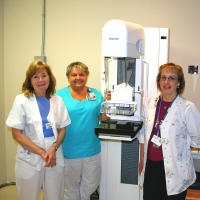Breast Health: Tackling the Fear Factor
 |
| from left, Diane Saunders, Debra Corkins, and Pauline Davis surround a new mammography unit installed last month at the North Adams Regional Hospital. |
 |
| from left, Diane Saunders, Debra Corkins, and Pauline Davis surround a new mammography unit installed last month at the North Adams Regional Hospital. |
| If you would like to contribute information on this article, contact us at info@iberkshires.com. |